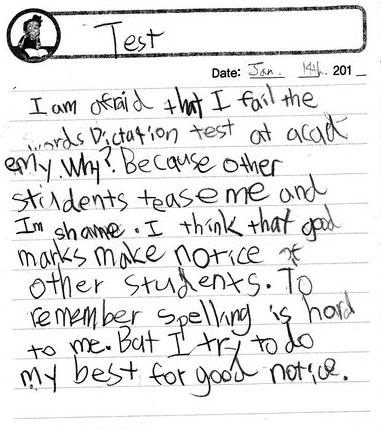I have a 1st grade (elementary) student named Chaewon. Her mother is making her do additional English homework that is not part of our curriculum – because it's never too early to overburden your kids with homework. She's making Chaewon write 2 English diary entries each week.
Here are Chaewon's first two extra-work diary entries.


My first reaction was just to recognize the heart-wrenching agony of being a 1st grader in such a demanding cultural milieu.
My second reaction was: how is it possible for a 1st grader to have written this, in English, when she's been at KarmaPlus less than a year and does not stand out as a remarkable student.
But my third reaction was to recall that Chaewon is not a regular student. I believe that before she came to KarmaPlus, she was in an English kindergarten in Dubai. Probably, that was an immersion environment. I was struck by her at the time she first came, that she was a bit like a very shy "native speaker" child of her age with some recent trauma in her past, who was very good at verbal communication with English, but only on her terms and when she was willing, but was also quite "behind" on literacy skills – she could barely spell her name when she came to us. Perhaps the recent trauma in her past was coming to Korea?
Korean hagwon-based English education is of course almost opposite in orientation from her strengths, then: it depreciates spoken ability in favor of a kind of mute, passive, but grammatically precise literacy – even among young elementary students. Of course I try to be a counterweight to that – but there's only so much I can achieve, seeing kids one or two hours a week. But because she is so weak in areas that hagwon curricula emphasizes, she is perceived by her Korean teachers as being mediocre at best, and her strange alternation between shyness and aggressiveness makes her seem unmotivated if not rude.
And, still, with respect to Chaewon's diary, I wonder – did she write this without assistance? I'm not sure. The linguistics are quite strange – on the one hand, it seems very private and sincere and strikingly sad, too. But on the other hand, it seems that even if a native-speaking first grader were writing this, I'd have to wonder, because there's a strange self-aware craftedness to the prose that doesn't seem right for a child that age. For example, the almost literary-usage style of "but" in the sentence "My familiar voice is not the alarm but my brother's voice." That's in weird contrast to the mis-uses of the terms "used to" or "notice," both of which bespeak an over-reliance on literalist look-ups in dictionary or grammar text, which is the sort of error I more normally associate with middle school students of middle-to-high competence.
I'm curious now. I may want to follow up.
[daily log: walking, 5.5 km]


